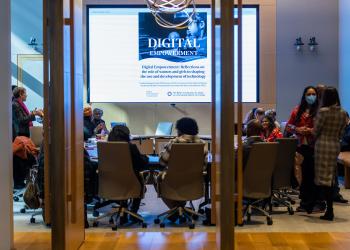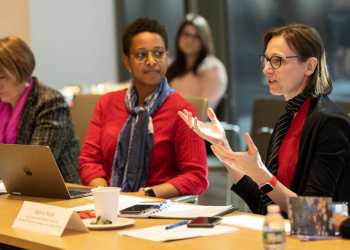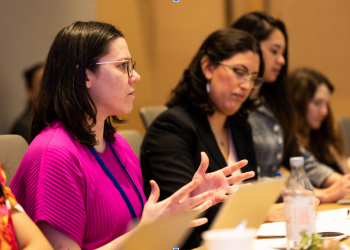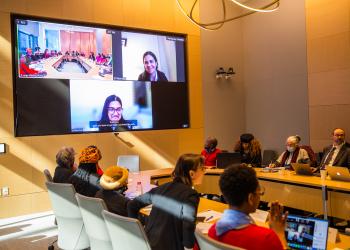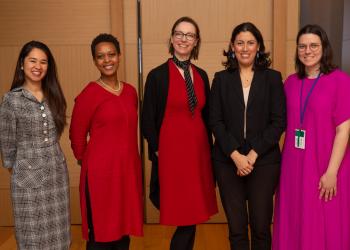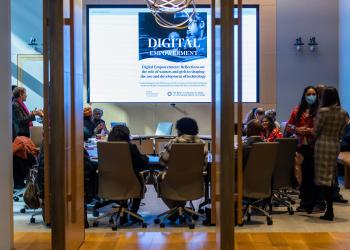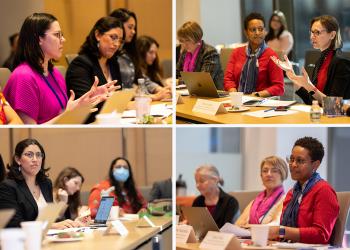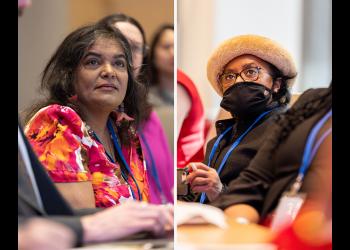BIC and Baha’i community of Canada explore the role of women in shaping technology
What does it mean for women and girls to be empowered users of technology? And beyond that: what does it mean for women and girls to be actively shaping the use and development of that technology?
These were questions that opened a parallel event at the 67th Commission on the Status of Women, cohosted yesterday by the Baha’i International Community and the Baha’i Community of Canada.
“What does it mean for a community to be empowered in a way that it can make intentional choices about the adoption of different technologies and how they are conducive to human flourishing?” asked Andrea Salguero, Director of the Office of Public Affairs for the Baha'i Community of Canada, who organized the event and offered opening remarks.
Titled “Digital Empowerment: Reflections on the role of women and girls in shaping the use and development of technology,” the event featured a number of speakers exploring the intersection of gender and technology in Canada. It drew some 70 attendees from a variety of backgrounds.
Béatrice Maille, Legal Advisor and Minister-Counsellor at the Permanent Mission of Canada to the United Nations, placed issues of gender equality and technology in the context of ongoing processes in the UN system, such as the upcoming Summit of the Future and the proposed Global Digital Compact. “It’s really an important opportunity for us to make sure that the voices of women and girls are considered in these important spaces,” Maille said in offering opening remarks.
Meaghan Anderson, Gender and Safeguarding Manager at Digital Opportunity Trust and a member of the Canadian delegation to this year’s Commission, described aspects of her organization’s “Dare to Shift” program. This initiative focuses on equipping youth with digital skills for entrepreneurship, including through peer-to-peer support structures.
“When youth learn from each other, it creates an amazing support network, especially for young women,” Anderson said.
The potential for multitudes to benefit from the increased participation of women in the affairs of society was a theme highlighted by Liliane Nkunzimana, a Representative of the BIC who spoke at the event. “Through the extension of women’s participation, societal actors such as those in the private sector and the public sector, can be exposed to a multiplicity of perspectives, which, itself, is a prerequisite for building a future responsive to the whole range of human experience,” Nkunzimana noted.
Taban Behin, a researcher with the Center for Digital Tools and Social Transformation at the British Columbia Institute of Technology, explored what it means for women and girls to be empowered users of technology. Among the concepts Behin addressed were consciousness of how technology both shapes and is shaped by social, economic, political, and cultural forces; how grassroots agency and ownership can be strengthened in the adoption, use, and design of technology; and how technologies can be reevaluated and redesigned to be an extension of a society’s values, rather than running counter to them.
The role that local communities can play in shaping the social impact of digital technologies, especially among young people, was the focus of Eliza Rizal, a 3D animation student involved with the grassroots-based Junior Youth Spiritual Empowerment Program.
“The technologies that youth are engaging with can encourage them to think about themselves only,” Rizal observed. But she noted that communities have the potential to consciously foster qualities such as justice, generosity, patience, and cooperation, that help individuals contribute to the betterment of the world. “Everyone—children, youth, adults, grandparents—can be part of this process of thinking about how we can contribute to the betterment of our neighborhoods.”
A recording of the full event is available here.
